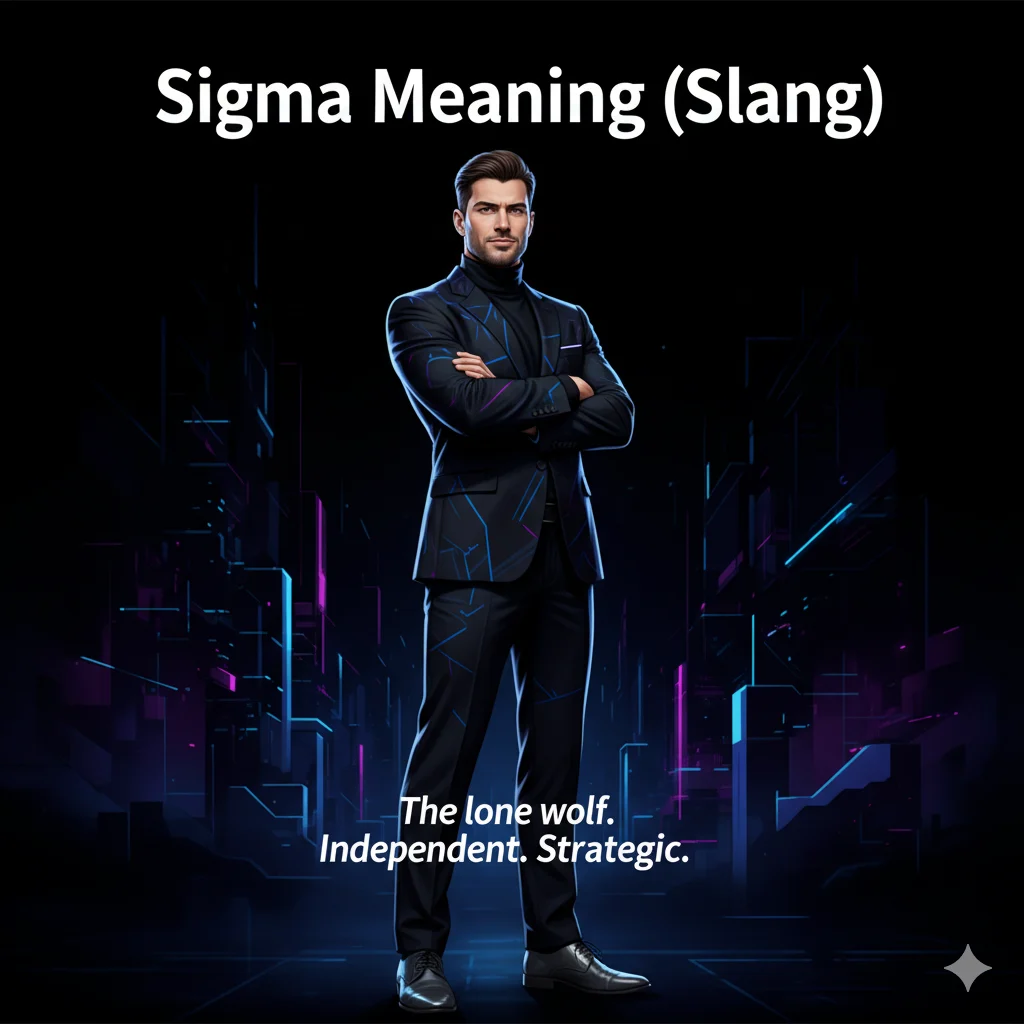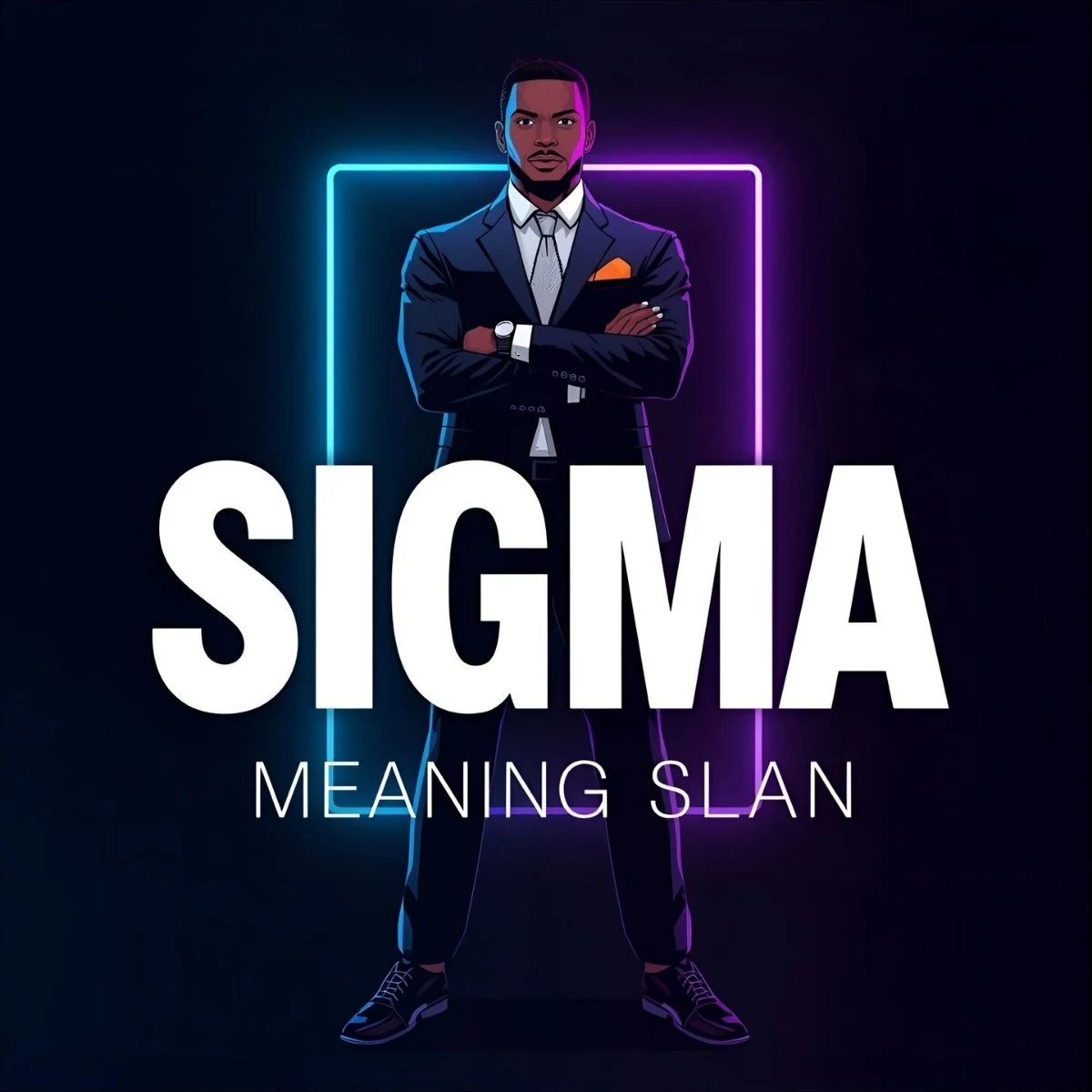Language never stands still. From memes to TikTok trends, slang words evolve almost daily. One of the most talked-about terms recently is “Sigma.” You’ve likely seen it paired with phrases like “Sigma male mindset” or “Acting Sigma” in online spaces.
But what does Sigma really mean in slang? Is it just another internet fad, or does it represent something deeper in how people view personality and social dynamics?
In this article, we’ll break down the true meaning of Sigma in slang, its origins, cultural impact, and how it compares to other terms like Alpha and Beta. You’ll also find examples, a comparison table, FAQs, and practical insights to fully understand the buzz behind this popular term.
What Does Sigma Mean in Slang?
In slang, Sigma usually refers to someone who is independent, confident, and doesn’t follow traditional social hierarchies. A Sigma is often described as a “lone wolf”—someone who doesn’t seek validation from others yet still commands respect.
The term is most commonly used in connection with Sigma males, a concept that contrasts with the traditional Alpha-Beta hierarchy. Instead of chasing status or dominance, the Sigma mindset emphasizes self-reliance, quiet confidence, and strategic thinking.

Origins of the Sigma Slang Term
The word “Sigma” borrows from the Greek alphabet, similar to how “Alpha” and “Beta” are used in personality stereotypes. However, its modern slang usage gained traction through online communities, memes, and self-help discussions about masculinity and social dynamics.
By the early 2020s, Sigma male content exploded on TikTok, YouTube, and Reddit, turning it into both a serious personality archetype and a satirical meme.
Key Traits of a Sigma Personality
People labeled as “Sigma” in slang often share the following traits:
- Independent and self-sufficient
- Confident without being loud or boastful
- Strategic thinkers who analyze situations carefully
- Comfortable being alone
- Reject traditional social hierarchies
- Mysterious or hard to read
- Values freedom over control
- Often admired but misunderstood
These traits make the Sigma mindset appealing to those who don’t fit into the Alpha-dominant or Beta-submissive stereotypes.
Sigma vs. Alpha vs. Beta: A Quick Comparison
Here’s a side-by-side comparison of the most common slang personality archetypes:
| Trait | Alpha | Beta | Sigma |
|---|---|---|---|
| Social Role | Leader, dominant | Follower, supportive | Lone wolf, independent |
| Confidence | Outward, assertive | Lower, often seeks validation | Quiet, internal confidence |
| Status Seeking | Craves recognition and control | Often conforms to fit in | Avoids status games |
| Social Circle | Big, influential group | Relies on others | Prefers small or no circle |
| Decision-Making | Bold, sometimes reckless | Hesitant, agreeable | Calculated, strategic |
| Perception | Charismatic leader | Loyal but overlooked | Mysterious, unpredictable |
This table helps highlight why Sigma has become such a popular slang label—it offers an alternative identity that feels both powerful and independent.
Why Sigma Slang Resonates Today

So why is Sigma such a trending concept in 2025?
- Rise of Individualism: More people value personal freedom over fitting into rigid roles.
- Social Media Influence: Memes and short videos amplify relatable archetypes.
- Rebellion Against Labels: Sigma appeals to those tired of being boxed into Alpha or Beta.
- Cultural Shifts in Masculinity: Men especially find Sigma appealing as it promotes quiet strength rather than toxic dominance.
This resonance explains why “Sigma” is used beyond just describing men—it’s now shorthand for anyone with a self-driven, non-conformist mindset.
Examples of Sigma in Everyday Slang
Here are a few ways you might hear or see Sigma used online:
- “He ghosted the whole party and worked on his startup—total Sigma move.”
- “Stop chasing people. Be Sigma, focus on yourself.”
- “That character in the movie? Definitely Sigma energy.”
- “Sigma mindset means you don’t need a crowd to shine.”
These examples show how the word has moved beyond strict definitions to represent a mindset, aesthetic, or lifestyle.
Common Misconceptions About Sigma
While Sigma slang is widely used, it’s also often misunderstood. Here are some clarifications:
- Not Just for Men: Despite being tied to the “Sigma male” trend, Sigma can apply to anyone.
- Not About Arrogance: Sigma doesn’t mean antisocial or rude—it’s about independence.
- Not Always Serious: Much of Sigma slang is used humorously in memes.
- Not Scientifically Backed: The Sigma concept is cultural, not psychological fact.

Criticism of the Sigma Slang Trend
Like most internet trends, Sigma isn’t free from criticism:
- Some argue it oversimplifies personalities into unrealistic categories.
- Others see it as toxic or exclusionary when misused.
- Many use it ironically, poking fun at self-help culture.
Still, its popularity proves that people crave new ways to express identity and mindset through language.
FAQs About Sigma Slang
Q1. Is Sigma the same as Alpha?
No. While Alphas thrive on leadership and dominance, Sigmas prefer independence and self-reliance.
Q2. Can women be Sigmas?
Yes. Sigma is not limited to men—it describes anyone with the lone wolf, independent mindset.
Q3. Is Sigma just a meme?
It started as a meme but has evolved into a mix of serious and humorous slang.
Q4. Is being Sigma a good thing?
It depends. Sigma traits like independence and strategy are admired, but taken to extremes, they may lead to isolation.
Q5. How do you know if you’re Sigma?
If you value independence, dislike following social hierarchies, and are comfortable being alone, you may identify with Sigma.
Conclusion
The slang meaning of Sigma goes far beyond just another internet buzzword. It reflects a cultural shift toward valuing independence, self-reliance, and rejecting rigid social roles. While some view it as a meme and others as a lifestyle label, its widespread usage shows its staying power in modern slang.
Whether you see yourself as Sigma or not, understanding the term helps you stay in touch with the evolving language of the digital age. After all, slang isn’t just words—it’s a mirror of society’s changing values.

Hi, I’m Jam Sun, the creator of Punspanda.com. I write fun, clever puns, jokes, and easy-to-read humor content designed to entertain, inform, and make people smile. My goal is simple: turn everyday words into share-worthy laughs.



